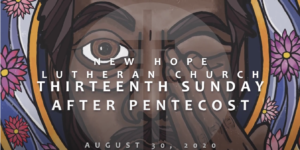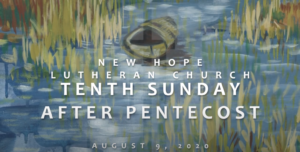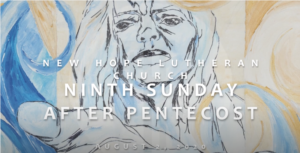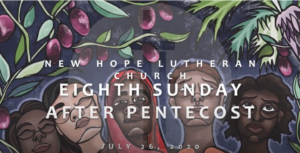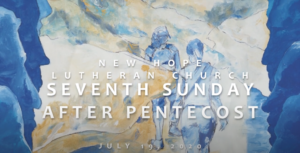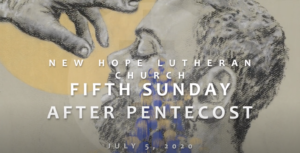Close
Log In using Email

Fifth Sunday after Pentecost
Matthew 11:16-19, 25-30
[Jesus said:] 16 “To what will I compare this generation? It is like children sitting in the marketplaces and calling to one another,
17 ‘We played the flute for you, and you did not dance;
we wailed, and you did not mourn.’
18 For John came neither eating nor drinking, and they say, ‘He has a demon’; 19 the Son-of-humanity came eating and drinking, and they say, ‘Look, a glutton and a drunkard, a friend of tax collectors and sinners!’ Yet wisdom is vindicated by wise deeds.”
25 At that time Jesus said, “I thank you, God, Lord of heaven and earth, because you have hidden these things from the wise and the intelligent and have revealed them to infants; 26 yes, God, for such was your gracious will. 27 All things have been handed over to me by God; and no one knows the Son except God, and no one knows God except the Son and anyone to whom the Son chooses to reveal God.
28 “Come to me, all you that are weary and are carrying heavy burdens, and I will give you rest.
29 Take my yoke upon you, and learn from me; for I am gentle and humble in heart, and you will find rest for your souls. 30 For my yoke is easy, and my burden is light.”
---------------
Please pray with me this morning, church:
Holy God,
Your people are weary.
Their souls are longing for rest.
Lead us to abide in your restful grace today.
Help us to rest,
That we might be energized for the work to which you have called us.
Amen.
---------------
For my very first Father’s Day this year, Tiffany and Oliver got me this wonderful contraption that straps up on my shoulders and lets Oliver sit up on top of them, which he really likes to do. It’s a carrier, but rather than strapped to my back or in front, this one puts him up, kind of up above everything where he can easily look around and see everything that’s going on.
We used it for the first time last Sunday when we went on a short hike over by our house. It works well, it turns out. It’s nice. It’s good. As I said, he likes to be up on my shoulders anyway, so this is a great thing for that.
But here’s the thing, once you’re all strapped up and in, there’s really no shifting around. You can take it off and on, take the kid out or put them back in, but it doesn’t really shift that well. So you’re pretty much stuck that way until you’re done. And we all know well that we’ve got a big kid, right…he’s growing, which is great and wonderful. But he’s like, close to 25 lbs now…so like, not the easiest thing to have strapped on top of your shoulders while you walk around for an hour.
That yoke is neither easy nor is that burden particularly light.
My shoulders really are just now starting to stop being so sore.
And it makes me wonder, church…what are you carrying around?
What burdens are you shouldering?
What aches and pains and soreness are weighing you down?
Maybe even what wounds are you bearing these days?
As we work our way through our summer series Unraveled, we’re exploring themes of the places in our lives and in our world where things have come unraveled, where things are in the process of unraveling, and where things are in need of becoming unraveled.
And this morning, we encounter Saul in this well-known story of his experience on his way to Damascus. And a little back story for you: Saul was from Tarsus, which is in modern south-central Turkey. He was Jewish—a Pharisee, actually—and from a devout Pharisaic family. He was in Jerusalem and he asks for letters from the high priest so that he could go to Damascus and bind and bring back any Christ-believers he finds on his way. Saul was a persecutor of the early Christ-believing communities and a somewhat vicious one at that.
See, Saul was present for the stoning of Stephen, the first murder of a Christ-believer…what, in the church, we call the first martyr of the faith. After that, Saul would also go into the houses of Christ-believers and take them away to prison. It seems that Saul derived some particular form of satisfaction from oppressing early Christ-believers.
Also, it’s important to note here that I’m using the term “Christ-believers” purposefully. Christians didn’t exist yet. The early Christ-believing communities were Hebrew and Greek people who had come to believe that Jesus was, in fact, the Christ…the Messiah. They were either Jewish Christ-believers or Greek Christ-believers. The earliest Christ-believing communities never really stopped being Jewish or Greek, they still maintained many of their customs. It wasn’t until later in Antioch that Christ-believers started being called Christians.
So, Saul’s on his way to Damascus to arrest some more Christ-believers, and he has this otherworldly encounter with the risen Christ. “Saul…why do you persecute me?” This encounter literally knocks Saul down—he fell to the ground…and it literally changed him—it blinded him and he wasn’t able to see.
Saul has a transformation—spiritual, physical, emotional—Saul is completely transformed and changed.
This transformation is a lived experience. Contrary to how we approach our faith most of the time, this transformation is something physical and embodied. So often, we think exercises of our faith as having to do with our minds. Church, you can’t intellectualize a transformation, it’s something you feel, something you experience.
And this transformation, I think we could say it saved Saul. It certainly took him from this one road that he was on and picked him up and set him on an entirely new path. Saul would later be known as the apostle, Paul, one of the most prolific writers and ardent defenders of the Christian faith. I think we could say this transformation saved Saul. And as is true with us, church, you can’t intellectualize salvation, it’s something you feel and experience, something that happens to you.
Which is why I talk so much about liberation being about action. We can talk about issues and problems and discuss ways to address them, but until we lace up our shoes, get out, and actually do something about injustice, nothing will change.
It took an encounter with the risen Christ for Saul to do a complete about-face and transform from a zealous persecutor of Christ-followers to one of the most zealous proclaimers of Jesus the Christ as Savior and Lord. I think there’s a good argument to be made here for Paul’s zeal in proclaiming Christ as Messiah as being an attempt to make up for how brutally he treated the Christ-believing community before his encounter with Christ on the way to Damascus. I think Paul is trying to outdo himself for the years he spent viciously persecuting those who professed the name, Christ.
So, what’s been a turning point for you, in your life, church?
What has it taken for you to undergo this same kind of radical transformation?
How can we allow that transformation to move us from a place of intellectual understanding to an embodied faith? How can we be transformed from a passive discipleship to an active discipleship?
For me, it was moving to Chicago. It was leaving the North Texas suburb that I had grown up in and in many ways was all I knew and moving to a place where I could see injustice. It took people pointing certain things out to me, being patient with me, and explaining them to me. They didn’t have to do that, but I’m so incredibly grateful they did.
And ultimately, it took my willingness to change. Ultimately, people of God, transformation happens because you’re open to it…if you’re willing to have your hearts broken open and changed.
So, what does it take for you to be moved from a place of agreeing that an injustice has occurred to a place of actively working to right that injustice?
I would argue that’s what needed in this time we find ourselves in. We need to not only recognize the injustices present, but those who are being affected by these injustices need us who have been made uncomfortable to get to a place of joining in the work to correct these injustices.
This is the work of discipleship. It’s the work you were called to in your baptism.
It’s not easy work. taking on systems and structures and people in power…you will need every bit of energy you can muster for this work.
And that’s why the rest for your souls is important.
How can you pour into and fill others up, when you yourself are empty?
Rest is a holy and good thing. We need to be well-rested for this work. But we cannot remain at rest.
The yoke is easy and the burden is light—working to right injustice is the easiest…and the hardest thing you will ever do.
Easy, because it only requires you to recognize the image of God in someone else and their worthiness as a beloved child of God…
Difficult, because it requires you to give up something of yourself. Maybe it requires some unlearning on your part, maybe it requires some growth in understanding in some areas that you were previously so sure of, maybe it requires examining what you thought you knew and being willing to admit that you have been wrong…
Difficult, because it requires you to show up—a movement from passive to active discipleship.
The yoke is easy and the burden is light.
But it is a yoke, nonetheless. There is still some measure of burden to being a disciple of Jesus.
There is something required of you as a disciple.
Being a disciple of Jesus demands your life—that you lose your life in order to find it, that you give up your life for the sake of the other. The call to Christian discipleship is one of giving up…of letting go…of relinquishing. It’s a call to servanthood. A race to the bottom. There is certainly a cost associated with this discipleship.
There is a yoke. There is a burden.
But they are easy and light.
Find some time to rest this weekend, Church.
Find some time in your lives for rest and renewal.
God knows, your souls need it.
Rest up, because you’re needed.
Your voice. Your actions. Your very self.
You are needed in this moment.
Get some rest.
Then put that easy yoke back on your shoulders.
Loading Discusson...

